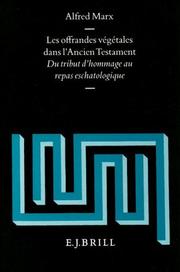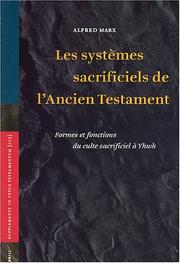| Listing 1 - 10 of 22 | << page >> |
Sort by
|
Book
ISBN: 9782830914122 2830914120 Year: 2011 Volume: 3b Publisher: Genève: Labor et Fides,
Abstract | Keywords | Export | Availability | Bookmark
 Loading...
Loading...Choose an application
- Reference Manager
- EndNote
- RefWorks (Direct export to RefWorks)

ISSN: 00835889 ISBN: 9004101365 9004275819 9789004101364 9789004275812 Year: 1994 Volume: v. 57 Publisher: Leiden ;New York Brill
Abstract | Keywords | Export | Availability | Bookmark
 Loading...
Loading...Choose an application
- Reference Manager
- EndNote
- RefWorks (Direct export to RefWorks)
The present monograph is the first, since 1848, to be entirely devoted to the study of the cereal offerings. Its purpose is to attract attention to a form of sacrifice which was largely neglected and solely considered as an appendix to the animal sacrifice. The study of their substance, ritual and the circumstances in which the cereal offerings are brought to God demonstrates their great complexity as well as their specific function. His vegetarian utopia has led P to give the cereal offerings a prominent place among the sacrifices. A similar appreciation of the cereal offerings is also found among the Essenes, and, finally, in the Christian Last Supper.
Sacrifice --- -Crops --- -Grain --- -Bread --- -Wine --- -Olive oil --- -Biblical teaching --- Biblical teaching --- 291.35 --- 221.08*4 --- -Vegetable oils --- Breads --- Baked products --- Cooking (Bread) --- Breadstuffs --- Cereal grains --- Cereals --- Grains --- Botany, Economic --- Field crops --- Flour --- Food --- Food crops --- Seed crops --- Agricultural crops --- Crop plants --- Farm crops --- Industrial crops --- Farm produce --- Plants, Cultivated --- Agronomy --- Crop science --- Plant products --- Burnt offering --- Worship --- Heilige plaatsen: altaren; tempels; pagoden; kerken; moskeeën; bossen; grotten; heilige landen en steden --- Theologie van het Oude Testament: cultus --- -Heilige plaatsen: altaren; tempels; pagoden; kerken; moskeeën; bossen; grotten; heilige landen en steden --- 221.08*4 Theologie van het Oude Testament: cultus --- 291.35 Heilige plaatsen: altaren; tempels; pagoden; kerken; moskeeën; bossen; grotten; heilige landen en steden --- -221.08*4 Theologie van het Oude Testament: cultus --- Bread --- Crops --- Grain --- Olive oil --- Wine --- Vegetable oils --- Bible. --- Antico Testamento --- Hebrew Bible --- Hebrew Scriptures --- Kitve-ḳodesh --- Miḳra --- Old Testament --- Palaia Diathēkē --- Pentateuch, Prophets, and Hagiographa --- Sean-Tiomna --- Stary Testament --- Tanakh --- Tawrāt --- Torah, Neviʼim, Ketuvim --- Torah, Neviʼim u-Khetuvim --- Velho Testamento --- Criticism, interpretation, etc. --- Sacrifice - - Biblical teaching --- Crops - - Biblical teaching --- Grain - - Biblical teaching --- Bread - - Biblical teaching --- Wine - - Biblical teaching --- Olive oil - - Biblical teaching --- Biblical teaching. --- -Sacrifice --- -Olive oil -

ISBN: 900414286X 9786610867943 142945279X 9047407067 1280867949 1433704056 9789004142862 9781429452793 9781433704055 9789047407065 Year: 2005 Volume: 105 Publisher: Leiden ; Boston : Brill,
Abstract | Keywords | Export | Availability | Bookmark
 Loading...
Loading...Choose an application
- Reference Manager
- EndNote
- RefWorks (Direct export to RefWorks)
The present study is an attempt to decode the sacrificial system of ancient Israel, to understand how the different kinds of sacrifice are related, the choice of the sacrificial materials, and the shape of their ritual. Special attention is given to the social function of sacrifice. Starting from a comparison between the isolated data and the systems of P, the Chronist and Ezekiel, the study stresses the specificity of each system, and tries to point out the distinctive features of Israel's sacrificial cult. The concluding chapter sketches the evolution of the sacrificial cult. An exhaustive index of textual references offers an overview of all Old Testament passages relating to sacrifice.
Sacrifice in the Bible. --- Bible. --- Antico Testamento --- Hebrew Bible --- Hebrew Scriptures --- Kitve-ḳodesh --- Miḳra --- Old Testament --- Palaia Diathēkē --- Pentateuch, Prophets, and Hagiographa --- Sean-Tiomna --- Stary Testament --- Tanakh --- Tawrāt --- Torah, Neviʼim, Ketuvim --- Torah, Neviʼim u-Khetuvim --- Velho Testamento --- Criticism, interpretation, etc.
Book
ISBN: 9782406085447 2406085449 9782406085454 Year: 2019 Volume: 88 Publisher: Paris: Classiques Garnier,
Abstract | Keywords | Export | Availability | Bookmark
 Loading...
Loading...Choose an application
- Reference Manager
- EndNote
- RefWorks (Direct export to RefWorks)
Etude de la stratégie identitaire de l'Israël antique pour construire un Etat, expliquer sa disparition quelques siècles plus tard, puis assurer, malgré la perte de son territoire historique et sa dispersion, la pérennité du Judaïsme naissant. L'étude de cette stratégie permet de mettre en évidence un processus d'ethnicisation largement original.
Jews --- Judaism --- History --- Identity --- Bible. --- Antico Testamento --- Hebrew Bible --- Hebrew Scriptures --- Kitve-ḳodesh --- Miḳra --- Old Testament --- Palaia Diathēkē --- Pentateuch, Prophets, and Hagiographa --- Sean-Tiomna --- Stary Testament --- Tanakh --- Tawrāt --- Torah, Neviʼim, Ketuvim --- Torah, Neviʼim u-Khetuvim --- Velho Testamento --- History of Biblical events. --- 316:2 <569.4> --- 933.13 --- 316:2 <569.4> Godsdienstsociologie--Israël --- Godsdienstsociologie--Israël --- 933.13 Geschiedenis van het Joodse volk: Jozua en Rechters; Intocht--(=Ijzer 1a) --- Geschiedenis van het Joodse volk: Jozua en Rechters; Intocht--(=Ijzer 1a) --- History of Biblical events
Book
Year: 2000 Publisher: Paris: Cerf,
Abstract | Keywords | Export | Availability | Bookmark
 Loading...
Loading...Choose an application
- Reference Manager
- EndNote
- RefWorks (Direct export to RefWorks)
Le culte sacrificiel est omniprésent dans la religion d'Israël et dans les livres de l'Ancien Testament. Mais les chrétiens, trop souvent, l'ignorent ou le méprisent, sous prétexte qu'il est définitivement périmé. Que peuvent-ils comprendre à ce culte qui a pourtant permis aux prophètes et aux fidèles d'Israël de vivre leur foi au Dieu unique ?Pour dépasser les préjugés, Alfred Marx, professeur d'Ancien Testament à la Faculté de théologie protestante de Strasbourg, décrit soigneusement ce culte sacrificiel au temple de Jérusalem. Il permet ainsi de savoir en quoi il consistait exactement et de comprendre sa logique théologique. Puis il étudie son évolution, sous l'action des prophètes, et montre que, dans les derniers siècles avant l'ère chrétienne, il tend vers une spiritualisation et même une certaine sacramentalisation.
Book
ISBN: 9782830918083 2830918088 Year: 2023 Publisher: Genève Labor et Fides
Abstract | Keywords | Export | Availability | Bookmark
 Loading...
Loading...Choose an application
- Reference Manager
- EndNote
- RefWorks (Direct export to RefWorks)
"À la suite du commentaire paru dans la même collection en 2011 sur Lévitique 17–27, Alfred Marx présente ici la première partie du Lévitique où sont passés en revue les différents types de sacrifices que les Israélites, selon le cas, peuvent ou doivent apporter à YHWH. -- Indépendamment de l’intérêt de cette étude pour l’histoire des religions et pour la connaissance des pratiques cultuelles de l’Israël ancien, ce commentaire a aussi une portée théologique en ce qu’il démonte un certain nombre d’interprétations traditionnelles encore admises de nos jours, notamment l’idée selon laquelle l’institution sacrificielle aurait eu pour fonction principale d’apaiser la colère divine. -- Ce que démontre, entre autres, ce commentaire est que le sacrifice est fondamentalement un repas offert à Dieu en tant qu’hôte de marque que l’on veut honorer de la sorte, un Dieu qui est foncièrement bienveillant à l’endroit de son peuple." --Provided by publisher
Book
Year: 2000 Publisher: Paris
Abstract | Keywords | Export | Availability | Bookmark
 Loading...
Loading...Choose an application
- Reference Manager
- EndNote
- RefWorks (Direct export to RefWorks)
Book
Year: 2000 Publisher: Paris Cerf
Abstract | Keywords | Export | Availability | Bookmark
 Loading...
Loading...Choose an application
- Reference Manager
- EndNote
- RefWorks (Direct export to RefWorks)
Book
Year: 2005 Publisher: Leiden Brill
Abstract | Keywords | Export | Availability | Bookmark
 Loading...
Loading...Choose an application
- Reference Manager
- EndNote
- RefWorks (Direct export to RefWorks)
Sacrifice in the Bible --- Bible. --- Criticism, interpretation, etc.
Article
Year: 2003
Abstract | Keywords | Export | Availability | Bookmark
 Loading...
Loading...Choose an application
- Reference Manager
- EndNote
- RefWorks (Direct export to RefWorks)
| Listing 1 - 10 of 22 | << page >> |
Sort by
|

 Search
Search Feedback
Feedback About UniCat
About UniCat  Help
Help News
News